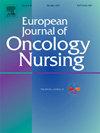Families' experience of anticipatory grief in home-based palliative cancer care and their support needs: A qualitative study
IF 2.7
3区 医学
Q1 NURSING
引用次数: 0
Abstract
Purpose
The aim of this study was to investigate how families of patients with cancer in palliative care experience anticipatory grief and their expressed support needs in relation to loss and grief.
Method
The study applied a qualitative hermeneutic-phenomenology framework. Qualitative data were obtained through semi-structured family interviews with five families living in a municipality in Denmark. The interviews were audiotaped, transcribed and analyzed using a thematical analytical approach.
Results
Three major themes were identified (1) anticipatory grief constantly present in everyday life. Anticipatory grief occurred when families watched the illness progress, and they experienced physical, cognitive and relational losses both with the patient and within family. (2) Experience of support from both family and professionals. (3) Families change perception when illness is present in daily life. Families experienced loss as a dynamic process oscillating between living their everyday life and feeling the presence of illness.
Conclusion
The study highlighted family's anticipatory grief is not addressed sufficiently in palliative care. Anticipatory grief occurred when families watched the illness progress, and they experienced physical, cognitive and relational losses both with the patient and within the family. Clinical interventions, such as a model for family interventions during anticipatory grief, are required to address different palliative care trajectories and reduce anticipatory grief in families.
以家庭为基础的姑息性癌症照护中家属预期悲伤的体验及其支持需求:一项质性研究
目的本研究旨在探讨姑息治疗癌症患者的家属如何体验预期悲伤,以及他们表达的与失去和悲伤相关的支持需求。方法采用定性解释学-现象学框架进行研究。定性数据是通过对居住在丹麦一个自治市的五个家庭的半结构化家庭访谈获得的。访谈录音,转录和分析使用主题分析方法。结果确定了三个主要主题:(1)预期性悲伤持续存在于日常生活中。当家人看着病情的发展,他们经历了与病人和家人在身体上、认知上和关系上的损失时,就会出现预期的悲伤。(2)家庭和专业人士支持的经验。(3)当日常生活中出现疾病时,家庭会改变观念。家庭失去亲人是一个动态的过程,在日常生活和疾病之间摇摆不定。结论在姑息治疗中,家属的预期悲痛未得到充分重视。当家人看着病情的发展,他们经历了与病人和家庭的身体、认知和关系上的损失时,就会出现预期的悲伤。临床干预,如预期悲伤期间的家庭干预模式,需要解决不同的姑息治疗轨迹和减少预期悲伤的家庭。
本文章由计算机程序翻译,如有差异,请以英文原文为准。
求助全文
约1分钟内获得全文
求助全文
来源期刊
CiteScore
4.40
自引率
3.60%
发文量
109
审稿时长
57 days
期刊介绍:
The European Journal of Oncology Nursing is an international journal which publishes research of direct relevance to patient care, nurse education, management and policy development. EJON is proud to be the official journal of the European Oncology Nursing Society.
The journal publishes the following types of papers:
• Original research articles
• Review articles

 求助内容:
求助内容: 应助结果提醒方式:
应助结果提醒方式:


